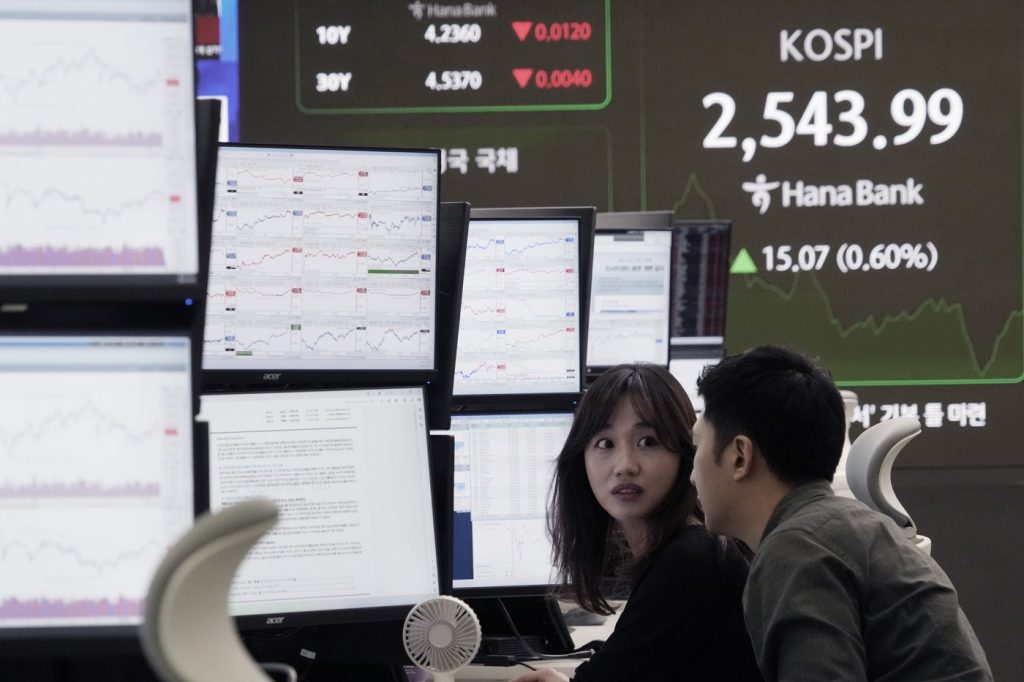BANGKOK (AP) — Asian shares and U.S. futures showed an upward trend on Wednesday following a significant downturn on Wall Street, where the S&P 500 index lost all of its gains made since the U.S. election. As the annual session of China’s largely ceremonial legislature commenced, Premier Li Qiang announced plans to maintain a growth rate for the economy at approximately 5% per year in 2025, reaffirming last year’s target. He promised increased government spending and additional measures aimed at promoting economic growth.
U.S. stock markets encountered a sharp decline after new tariff laws came into effect on Tuesday, imposing higher tariffs on imports from China, Canada, and Mexico. Investors are now turning their attention to President Donald Trump's upcoming speech to Congress and the nation. Early Wednesday trading saw S&P 500 futures climb by 0.7%, while the Dow Jones Industrial Average rose by 0.6%.
In Asia, the Nikkei 225 index in Tokyo rose slightly by less than 0.1% to reach 37,356.44, while Hong Kong’s Hang Seng surged 1.2% to 23,207.16. The Shanghai Composite index remained nearly stable at 3,324.16. Meanwhile, in South Korea, the Kospi increased by 0.7% to 2,546.03; however, Australia’s S&P/ASX 200 index saw a decline of 1.2% to 8,100.60.
The U.S. stock market was hit hard on Tuesday, compounding previous losses and indicating an escalation in the trade war between the U.S. and its major trading partners. Following the tariff impositions, which included a 25% tariff on imports from Canada and Mexico and a 20% increase against imports from China, all three countries reacted with retaliatory measures, leading to growing apprehension about a potential global economic slowdown.
The S&P 500 dropped by 1.2% to close at 5,778.15, with over 80% of its constituent stocks finishing lower. Similarly, the Dow Jones fell 1.6% to 42,520.99, and the Nasdaq composite dropped 0.4% to 18,285.16. The tech-heavy index briefly registered a 10% decline from its most recent peak, marking market correction territory, although gains from notable companies such as Nvidia and Microsoft helped to minimize overall losses.
Financial institutions experienced substantial declines, contributing heavily to the downward pressure on the S&P 500 index. JPMorgan Chase fell by 4%, while Bank of America faced a loss of 6.3%. Speculation surrounding potential changes to tariff policies continues, as after Tuesday’s market close, Commerce Secretary Howard Lutnick indicated that the U.S. would likely reach a compromise with Canada and Mexico on tariffs, potentially announcing details as early as Wednesday.
Prior to the election of Trump in November, expectations for economic improvements fueled a market rally; however, current concerns regarding tariffs inflating consumer prices and reigniting inflationary pressures are continuing to dampen sentiments on Wall Street and in broader economic circles. Retailers, including Target and Best Buy, cautioned about the financial implications of the tariffs in their latest earnings reports. Despite Target surpassing Wall Street earnings forecasts, it reported an anticipated “meaningful pressure” on profits resulting from tariffs and other increased costs, resulting in a 3% decline in its stock price.
Best Buy experienced a dramatic 13.3% drop, marking the largest single-day decline among S&P 500 stocks, following a weaker-than-expected earnings forecast along with tariff-related warnings. Concerns about corporate earnings are compounded by recent economic data signaling a rising pessimism among U.S. households regarding inflation and a downturn in consumer spending, a critical driver of economic expansion amidst elevated interest rates.
In response to the newly implemented U.S. tariffs, China announced it would impose additional tariffs of up to 15% on key U.S. agricultural exports, targeting products such as chicken, pork, soy, and beef. Furthermore, Canada outlined plans to target over $100 billion worth of U.S. goods with tariffs within the next three weeks, while Mexico has also indicated forthcoming tariffs on U.S. imports.
On the commodity markets early Wednesday, U.S. benchmark crude oil saw a decline of 70 cents to settle at $67.56 per barrel, while Brent crude, the international standard, dropped 37 cents to $70.67 per barrel. The U.S. dollar experienced a slight increase, trading at 149.99 Japanese yen, up from 149.82 yen, while the euro slipped from $1.0626 to $1.0607. Bitcoin was valued at around $97,850 according to CoinDesk.










